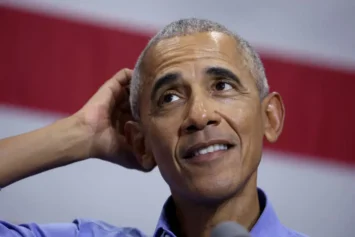Iran’s Supreme Leader Ayatollah Ali Khamenei warned that his nation would destroy Tel Aviv and Haifa if Israel decides to attack its nuclear infrastructure.
The intent of Iran’s nuclear capabilities has been an obsession of Israel. The Israelis are trying to use President Obama’s visit to get the U.S. to agree to join Israel in attacking Iranian nuclear plants if they deem that Iran is developing a nuclear weapon.
But Obama has backed away from making such a pledge, opting instead for sanctions and diplomatic pressure to convince Iran to halt its nuclear program.
Obama said in Israel that “America will do what we must to prevent a nuclear Iran.” He also added that there was still time for a diplomatic solution. Russia has indicated that negotiations with Iran to ease its nuclear ambitions seemed to be making progress.
But Khamenei appears to have little patience with the pace of negotiations, preferring instead to work with threats.
“At time the officials of the Zionist regime (Israel) threaten to launch a military invasion, but they themselves know that if they make the slightest mistake the Islamic Republic will raze Tel Aviv and Haifa to the ground,” he said in a televised speech to mark the Iranian new year.
Even while issuing the threat, Khamenei dismissed Israel’s military might, saying it is “not big enough to stand out among the Iranian nation’s enemies.”
“We have told you numerous times that we are not after nuclear weapons,” Khamenei said, directing his comments to Washington in front of thousands of faithful who had come to hear him speak at the Imam Reza Shrine in Mashhad.
The leader appeared uninterested in talks with the U.S., which has not had a relationship with Iran since its 1979 Islamic Revolution and the ensuing hostage crisis involving American diplomats in Tehran.
“I am not optimistic about these talks. Why? Because our past experiences show that talks for the American officials do not mean for us to sit down and reach a logical solution … What they mean by talks is that we sit down and talk until Iran accepts their viewpoint,” Khamenei said.
“I am not optimistic about their comments, but I am not opposed either,” he said, adding that the solution to the issue was “close by and easy” if the United States genuinely wanted to reach an agreement.
Khamenei said Iran had a “natural right” to enrich uranium for nuclear energy and that it should be respected by the world.
But he doesn’t have credibility on the issue, because in the past Iran has hidden nuclear work from U.N. inspectors and not opened up to their investigations.
At talks in Istanbul, Russia said Iran was offered modest sanctions relief if it curbed its most sensitive nuclear activity.
“This progress is real, but it is not sufficient to speak of a definitive shift,” Russian Deputy Foreign Minister Sergei Ryabkov, Moscow’s chief negotiator, told reporters.
“We cannot say this progress is irreversible. This alarms us a little, but from round to round, we have a more and more businesslike discussion of all the issues.”
In a speech to Israeli university students, President Obama said “strong and principled diplomacy” remained the best way to ensure that Iran eschewed nuclear weapons.
“We know that there remains time to pursue a diplomatic resolution … with the sense of urgency that is required. But Iran must know this time is not unlimited,” he said.
“Iran must not get a nuclear weapon. This is not a danger that can be contained. I have said to the world that all options are on the table for achieving our objectives,” Obama added, alluding to last-resort military action.
In the view of an Israeli cabinet minister, Silvan Shalom, Obama’s thinking is clear.
“He (Obama) also knows that there is a target date for the matter of attacking Iran to deny it nuclear weapons,” Shalom told Israel Radio. “He knows it, and we know it.”


